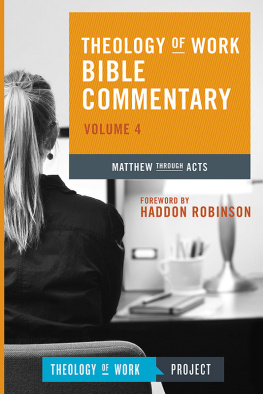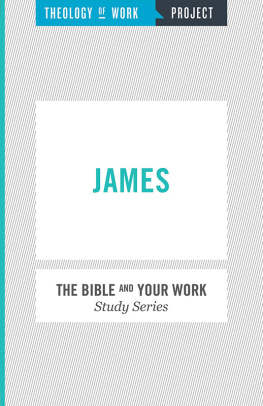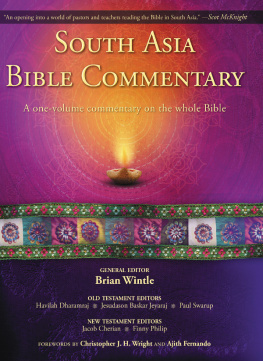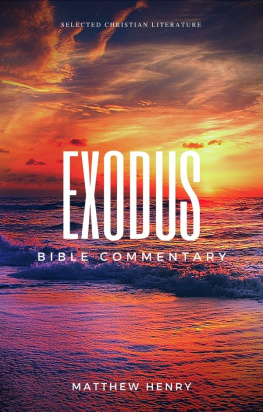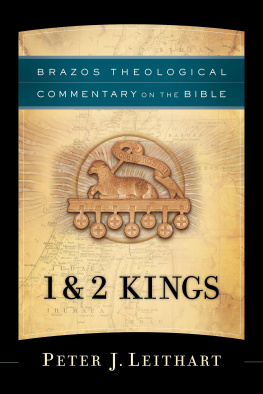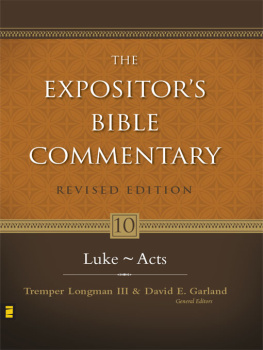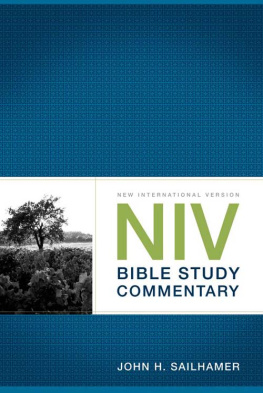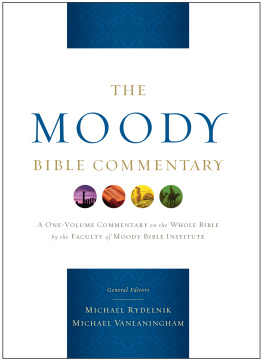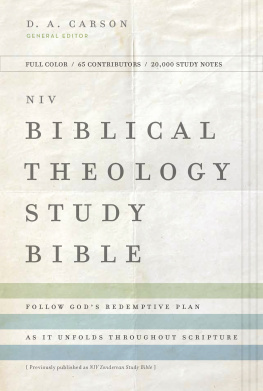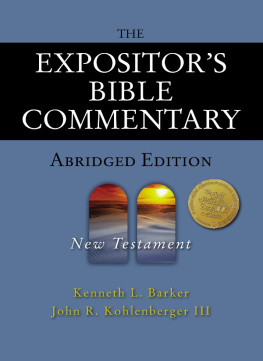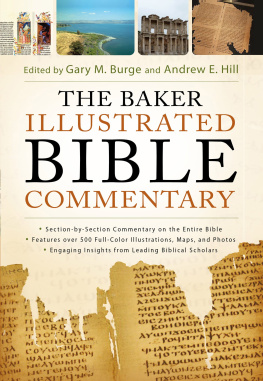THEOLOGY OF WORK BIBLE COMMENTARY, VOLUME 4: MATTHEW THROUGH ACTS (eBook edition)
Copyright 2014 by the Theology of Work Project, Inc.
EBook edition published by Hendrickson Publishers Marketing, LLC, P.O. Box 3473, Peabody, Massachusetts 019613473 under license from the Theology of Work Project, Inc. No part of the eBook edition may be reproduced or transmitted in any form or by any means, electronic or mechanical, including photocopying, recording, or by any information storage and retrieval system, without permission in writing from the publisher.
Online edition copy permission is governed by a Creative Commons 4.0 license available at http://www.theologyofwork.org/about/cc-license/.
ebook ISBN 978-1-61970-648-4
Unless otherwise noted, the Scripture quotations contained herein are from the New Revised Standard Version Bible, Copyright 1989, Division of Christian Education of the National Council of the Churches of Christ in the U.S.A., and are used by permission. All rights reserved.
Scripture quotations marked (NIV) are taken from the Holy Bible, New International Version, NIV. Copyright 1973, 1978, 1984, 2011 by Biblica, Inc. Used by permission of Zondervan. All rights reserved worldwide. www.zondervan.com The NIV and New International Version are trademarks registered in the United States Patent and Trademark Office by Biblica, Inc.
Scripture quotations marked (NASB) are taken from the New American Standard Bible, Copyright 1960, 1962, 1963, 1968, 1971, 1972, 1973, 1975, 1977, 1995 by The Lockman Foundation. Used by permission. (www.Lockman.org)
Due to technical issues, this eBook may not contain all of the images or diagrams in the original print edition of the work. In addition, adapting the print edition to the eBook format may require some other layout and feature changes to be made.
First eBook edition October 2014
Abbreviations
Old Testament
Gen. (Genesis)
Exod. (Exodus)
Lev. (Leviticus)
Num. (Numbers)
Deut. (Deuteronomy)
Josh. (Joshua)
Judg. (Judges)
Ruth (Ruth)
1 Sam. (1 Samuel)
2 Sam. (2 Samuel)
1 Kgs. (1 Kings)
2 Kgs. (2 Kings)
1 Chr. (1 Chronicles)
2 Chr. (2 Chronicles)
Ezra (Ezra)
Neh. (Nehemiah)
Est. (Esther)
Job (Job)
Ps(s). (Psalm(s))
Prov. (Proverbs)
Eccl. (Ecclesiastes)
Song (Song of Songs)
Isa. (Isaiah)
Jer. (Jeremiah)
Lam. (Lamentations)
Ezek. (Ezekiel)
Dan. (Daniel)
Hos. (Hosea)
Joel (Joel)
Amos (Amos)
Obad. (Obadiah)
Jonah (Jonah)
Mic. (Micah)
Nah. (Nahum)
Hab. (Habakkuk)
Zeph. (Zephaniah)
Hag. (Haggai)
Zech. (Zechariah)
Mal. (Malachi)
New Testament
Matt. (Matthew)
Mark (Mark)
Luke (Luke)
John (John)
Acts (Acts)
Rom. (Romans)
1 Cor. (1 Corinthians)
2 Cor. (2 Corinthians)
Gal. (Galatians)
Eph. (Ephesians)
Phil. (Philippians)
Col. (Colossians)
1 Thess. (1 Thessalonians)
2 Thess. (2 Thessalonians)
1 Tim. (1 Timothy)
2 Tim. (2 Timothy)
Titus (Titus)
Philem. (Philemon)
Heb. (Hebrews)
James (James)
1 Pet. (1 Peter)
2 Pet. (2 Peter)
1 John (1 John)
2 John (2 John)
3 John (3 John)
Jude (Jude)
Rev. (Revelation)
Any commentary references not in this particular volume can be found at the Theology of Work website (www.theologyofwork.org), along with video interviews and sidebars on people in the work world.
Foreword
The Theology of Work Bible Commentary is unique in that it explores what the entire Bible says about work. It represents more than five years of research by 140 contributors from sixteen countries, guided by an international steering committee of twenty scholars, pastors, and Christians from a variety of workplaces. We are thankful to God for this opportunity to present it to you in this volume.
Why does anyone need a theology of work? When we talk about a theology, it can sound as stuffy as a tomb. Theology is often considered the domain of scholars who are wrestling with questions that no one ever asks, or solving problems that have never really arisen. When we talk about theology, however, we are really talking about what we know or do not know about God. Everyone does theology. Atheists who say they dont believe in God are already dealing with theology. Wars are fought over theology by people who are convinced that they are doing Gods will. Agree with them or not, everyone everywhere does theology. People in the workplace who may never attend church are dealing with theology in some way every day. Ultimately, the questions we ask about God are not merely religious, they are life altering. In fact, what you believe about God may be the most important thing you ever think about. Thats theology!
When it comes to work, theology is seldom practiced out loud. During my early years as president at Denver Seminary, I hosted a morning Bible study for business people. After class, over breakfast, we discussed the myriad dilemmas these workers and leaders faced in the workplace. Again and again, I heard, Youre the first pastoral person to actively address how my faith relates to my work. It was then that I realized there was a great divide between the leadership of the church and the everyday lives of the people they are called to equip.
At its heart, the perceived distance between God and everyday work is a theological issue. Most Christians believe that God cares about how we relate to others, how we relate to him, and whether we cheat, steal, lie, or break the Ten Commandments. However, it would surprise a lot of us to learn that our work matters to God. God cares what we do for a living, how we do it, and how we use our resources. As it turns out, the Bible has much to say about work. In fact, work is a major topic in the Bible, beginning with the surprising statement in Genesis 2:15 that God created people to worknot as a punishment, but as a pleasure and a way of relating to God himself.
The Scriptures provide principles that both give meaning to work and tell us how to work. Unfortunately, there is not a book in the Bible called First and Second Executive or Letter to the Christian Plumbers. Instead, what the Bible teaches about Gods view of work is embedded in the Scriptures. Only a few of the biblical writers speak directly about the work that people do. They simply assume it. For instance, one of the Ten Commandments declares, Remember the sabbath day and keep it holy (Exod. 20:8), as if the only day God cared about was the Sabbath. But the command also says, Six days you shall labor and do all your work (Exod. 20:9). So the command deals not only with a special day when we can rest, but with the other days of the week designed for work.
The Theology of Work Bible Commentary goes through the Bible book by book to bring to the surface what we might not have seen about work at first blush. For example, consider the last book of the Bible, Revelation. It is possible to be so caught up in the visions in Revelation and questions about when they will occur, that we do not see that the Scripture also tells us about work now and in the future. You might be surprised that the Song of Solomon, a love poem, has quite a bit to say about workers and work. This book attempts through a study of the Scriptures to answer the question, Does the work we do matter to God?

